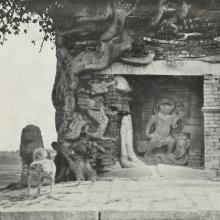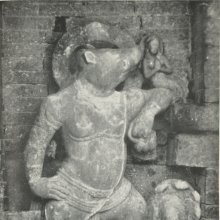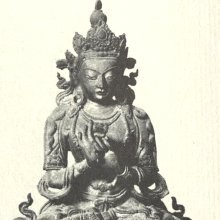Dhu, Dhū: 11 definitions
Introduction:
Dhu means something in Hinduism, Sanskrit. If you want to know the exact meaning, history, etymology or English translation of this term then check out the descriptions on this page. Add your comment or reference to a book if you want to contribute to this summary article.
Images (photo gallery)
In Hinduism
Vyakarana (Sanskrit grammar)
Source: Wikisource: A dictionary of Sanskrit grammarDhu (धु).—A technical term in the Jainendra Vyakarana for धातु (dhātu) (a root) which is used freely by the ancient grammarians and Panini.

Vyakarana (व्याकरण, vyākaraṇa) refers to Sanskrit grammar and represents one of the six additional sciences (vedanga) to be studied along with the Vedas. Vyakarana concerns itself with the rules of Sanskrit grammar and linguistic analysis in order to establish the correct context of words and sentences.
Chandas (prosody, study of Sanskrit metres)
Source: Shodhganga: a concise history of Sanskrit Chanda literatureDhū (धू) is the name of a Sanskrit metre (chandas) defined by Bharata, to which Hemacandra (1088-1173 C.E.) assigned the alternative name of Keśā in his auto-commentary on the second chapter of the Chandonuśāsana. Hemacandra gives these alternative names for the metres by other authorities (like Bharata), even though the number of gaṇas or letters do not differ.

Chandas (छन्दस्) refers to Sanskrit prosody and represents one of the six Vedangas (auxiliary disciplines belonging to the study of the Vedas). The science of prosody (chandas-shastra) focusses on the study of the poetic meters such as the commonly known twenty-six metres mentioned by Pingalas.
Languages of India and abroad
Sanskrit dictionary
Source: DDSA: The practical Sanskrit-English dictionaryDhu (धु).—5 U. (dhunoti dhunute, dhuta) See धू (dhū). धूनोति चम्पकवनानि धुनोत्यशोकम् (dhūnoti campakavanāni dhunotyaśokam) Kavirahasya.
--- OR ---
Dhu (धु).—f. Shaking, trembling.
Derivable forms: dhuḥ (धुः).
--- OR ---
Dhū (धू).—6 P., 1,5,9,1. U. (dhuvati, dhavati-te, dhūnoti, dhūnute, dhunāti, dhunīte, dhūnayati-te, also dhāvayati-te, dhūta-dhūna)
1) To shake, agitate, cause to move or tremble; धुन्वन्ति पक्षपवनैर्न नभो बलाकाः (dhunvanti pakṣapavanairna nabho balākāḥ) Ṛtusaṃhāra 3.12; धुन्वन् कल्पद्रुमकिसलयानि (dhunvan kalpadrumakisalayāni) Meghadūta 64; Kumārasambhava 7.49; R.4.67; Bhaṭṭikāvya 5.11;9.7;1.22.
2) To shake off, remove, throw off; स्रजमपि शिरस्यन्धः क्षिप्तां धुनोत्यहिशङ्कया (srajamapi śirasyandhaḥ kṣiptāṃ dhunotyahiśaṅkayā) Ś.7.24.
3) To blow away, destroy,
4) To kindle, excite, fan (as fire); वायुना धूयमानो हि वनं दहति पावकः (vāyunā dhūyamāno hi vanaṃ dahati pāvakaḥ) Mb.; पवनधूतः (pavanadhūtaḥ) ... अग्निः (agniḥ) Ṛtusaṃhāra 1.26.
5) To treat roughly, hurt, injure; मा न धावीररिं रणे (mā na dhāvīrariṃ raṇe) Bhaṭṭikāvya 9.5;15.61.
6) To shake off from oneself, free oneself from; (sevakāḥ) आरोहन्ति शनैः पश्चाद् धुन्वन्तमपि पार्थिवम् (ārohanti śanaiḥ paścād dhunvantamapi pārthivam) Pañcatantra (Bombay) 1.36.
7) To strive against, resist, oppose. (The following stanza from Kavirahasya illustrates the root in its different conjugations:-dhūnoti campakavanāni dhunotyaśokaṃ cūtaṃ dhunāti dhuvati sphuṭitātimuktaṃ | vāyurvidhūnayati campakapuṣpareṇūn yatkānane dhavati candanamañjarīśca ||)
--- OR ---
Dhū (धू).—f. Shaking, trembling, agitating.
Derivable forms: dhūḥ (धूः).
Source: Cologne Digital Sanskrit Dictionaries: Shabda-Sagara Sanskrit-English DictionaryDhu (धु).—[(ña) dhuñ] r. 7th cl. (dhunoti-dhunute) To shake, to agitate: see dhū kampane aka0 cālane saka0 svādi0 ubha0 aniṭ .
--- OR ---
Dhu (धु).—f.
(-dhuḥ) Shaking, trembling. E. dhu to shake bhāve ḍu aff.
--- OR ---
Dhu (धु).—[[dhū] (ña) dhūñ] r. 5th cl. (dhūnoti-dhūnute) r. 6th cl. dhūvati r. 9th cl. (dhanāti dhunite) r. 1st and 10th cls. dhavati-te-dhāvayati-te or dhūnayati) To shake or agitate, to make tremble; with ava, prefixed, 1. To abandon, to quit 2. To perceive. With nir 1. To destroy. 2. To go or move. With vi to make tremble or agitate. svā0 kyrā0 svādi0 ubha0 saka0 aniṭ . ubha0 pakṣe tudā0 ku0 para0 saka0 seṭ .
Source: Cologne Digital Sanskrit Dictionaries: Benfey Sanskrit-English DictionaryDhu (धु).—see dhū.
--- OR ---
Dhū (धू).— and dhu Dhu, ii, 5, dhūnu, ii. 9, dhunā, nī, [Parasmaipada.] [Ātmanepada.], and i. 6, dhuva, [Parasmaipada.] 1. To shake, [Meghadūta, (ed. Gildemeister.)] 63. 2. To shake out, to remove, [Bhāgavata-Purāṇa, (ed. Burnouf.)] 2, 8, 5. 3. To blow (as wind), Mahābhārata 3, 2733. 4. To shake off, Mahābhārata 5, 1588. 5. To struggle, to resist, [Pañcatantra] i. [distich] 42. Anomal. potent. dhunet, Mahābhārata 13, 5006. Pass. with the terminations of the [Parasmaipada.], [Sāvitryupākhyāna] 4, 29. Ptcple. of the pf. pass. dhūta and dhuta, 1. Shaken, [Rāmāyaṇa] 3, 58, 37; 5, 16, 17. 2. Removed, [Rāmāyaṇa] 1, 31, 13; 1, 29, 11 Gorr. Frequent. dodhū and dodhūya, 1. To shake violently, Mahābhārata 12, 8564. 2. To move violently to and fro, Mahābhārata 12, 8563. 3. To be shaken violently, [Bhāgavata-Purāṇa, (ed. Burnouf.)] 8, 24, 36. [Causal.] dhūnaya, To shake, Mahābhārata 3, 444.
— With the prep. ava ava, 1. To shake off, to remove, Mahābhārata 3, 2033. 2. To refuse, [Vikramorvaśī, (ed. Bollensen.)] [distich] 130. avadhūta, 1. Cast off, [Bhāgavata-Purāṇa, (ed. Burnouf.)] 3, 1, 19. 2. Removed, dispersed, [Bhāgavata-Purāṇa, (ed. Burnouf.)] 7, 8, 32. 3. Disregarded, [Vikramorvaśī, (ed. Bollensen.)] [distich] 46. 4. Sent back, [Daśakumāracarita] in
— With vyava vy -ava, 1. To shake off, to remove, [Harivaṃśa, (ed. Calc.)] 11076. 2. To abuse, Mahābhārata 2, 2231. vyavadhūta, Indifferent in regard of life, Mahābhārata 6, 150.
— With ā ā, To shake, [Raghuvaṃśa, (ed. Stenzler.)] 16, 36. ādhūta, 1. Shaken, [Rāmāyaṇa] 2, 104, 9 Gorr. 2. Troubhed, [Rāmāyaṇa] 1, 65, 3
— With vyā vi-ā, To move to and fro, [Śākuntala, (ed. Böhtlingk.)] [distich] 22.
— With samā sam-ā, To shake, [Rāmāyaṇa] 1, 33, 13 Gorr.
— With ua, 1. To rouse, [Rāmāyaṇa] 1, 28, 14. 2. To shake, [Rāmāyaṇa] 2, 95, 8. 3. To blow, [Raghuvaṃśa, (ed. Stenzler.)] 7, 45. 4. To raise, [Rāmāyaṇa] 6, 92, 60. 5. To shake off, [Bhāgavata-Purāṇa, (ed. Burnouf.)] 8, 19, 38. 6. To dash out, [Harivaṃśa, (ed. Calc.)] 4315. uddhūta and uddhuta, Loud, [Harivaṃśa, (ed. Calc.)] 4718; 9608. Comp. Pāda -uddhīta, n. Kicking with the foot, Mahābhārata 4, 353.
— With samud sam-ud, 1. To rouse, Mahābhārata 1, 1336. 2. To shake, Mahābhārata 1, 3846.
— With ni ni, To move to and fro, [Harivaṃśa, (ed. Calc.)] 14650. (probably to be changed into vi-).
— With nis nis, To shake off, [Rāmāyaṇa] 2, 95, 10. 2. To remove, [Bhagavadgītā, (ed. Schlegel.)] 5, 17. 3. To disown, [Yājñavalkya, (ed. Stenzler.)] 2, 71. 4. To shake, [Harivaṃśa, (ed. Calc.)] 6238. 5. To torment, [Rāmāyaṇa] 5, 2, 26. nirdhūta, Deprived, [Harivaṃśa, (ed. Calc.)] 3531.
— With vinis vi-nis, 1. To shake off. [Bhāgavata-Purāṇa, (ed. Burnouf.)] 6, 5, 4. 2. To expel, [Rāmāyaṇa] 6, 16, 89. 3. To move to and fro, [Rāmāyaṇa] 2, 20, 4 Gorr.
— With pravinis pra-vi-nis, To fling to, Mahābhārata 12, 13417.
— With pari pari, To shake to and fro, [Bhāgavata-Purāṇa, (ed. Burnouf.)] 3, 13, 33.
— With pra pra, To blow away = to destroy, Mahābhārata 13, 1800.
— With vi vi, 1. To move to and fro, to shake, [Rāmāyaṇa] 2, 23, 4; Mahābhārata 1, 7035. 2. To blow, Mahābhārata 2, 1132. 3. To excite, [Sāvitryupākhyāna] 4, 29 (anomal. ptcple. of the pres. pass. vidhūyant). 4. To remove, [Rāmāyaṇa] 3, 30, 18. 5. To disperse, [Rāmāyaṇa] 1, 54, 6. 6. To drive away, [Kathāsaritsāgara, (ed. Brockhaus.)] 4, 108. 7. To shake off, [Mānavadharmaśāstra] 6, 85. [Causal.] To press hard, Mahābhārata 12, 4361.
— With pravi pra-vi, To drive away, [Harivaṃśa, (ed. Calc.)] 10492.
— Cf. [Latin] suffire, fimus; Iceland. dyja; perhaps [Gothic.] dauns.
Source: Cologne Digital Sanskrit Dictionaries: Cappeller Sanskrit-English DictionaryDhu (धु).—v. dhū.
--- OR ---
Dhū (धू).—dhūnoti dhūnute dhunoti dhunute (dhūvati, dhuvati, dhunāti, dhunīte), [participle] dhūta & dhuta shake, toss, agitate; shake off a thing from (2 [accusative]), cast away, remove; fan, kindle (fire); [intransitive] struggle, resist. [Intensive] dodhavīti & dodhūyate shake violently, flourish, swing, fan; [intransitive] move to and fro, totter, rush on.
Source: Cologne Digital Sanskrit Dictionaries: Monier-Williams Sanskrit-English Dictionary1) Dhu (धु):—1. dhu = 1. dhū q.v.
2) 2. dhu f. shaking, trembling, [cf. Lexicographers, esp. such as amarasiṃha, halāyudha, hemacandra, etc.]
3) 3. dhu = duh2 in sabar-dhu q.v. (cf. 2. dhru).
4) Dhū (धू):—1. dhū [class] 5. [Ātmanepada] [Parasmaipada] dhūnoti, nute, [Ṛg-veda; Atharva-veda];—dhunoti, nute, [Brāhmaṇa] etc. etc.;—[class] 6. [Parasmaipada] ([Dhātupāṭha xxvii, 9]) dhuvati, [Atharva-veda; Brāhmaṇa] (cf. ni-; [Potential] dhūvet, [Kāṭhaka]);—[class] 9. [Ātmanepada] [Parasmaipada] ([xxxi, 17]) [Potential] dhunīyāt, [Suśruta];—p. [Ātmanepada] dhunāna, [Bhāgavata-purāṇa];—[class] 1. [Parasmaipada] ([xxxiv, 29]) dhavati;—[class] 2. [Ātmanepada], 3. [plural] dhuvate (dhunvate?), [Śatapatha-brāhmaṇa];—p. dhuvāna, [Taittirīya-saṃhitā] ([perfect tense] dudhāva, [Mahābhārata], dhuve, [Atharva-veda]; dudhuvīta and dūdhot, [Ṛg-veda] : [Aorist] adhūṣṭa, 3. [plural] ṣata, [ib.]; adhoṣṭa, adhaviṣṭa; adhauṣīt, adhāvīt [grammar]; [future] dhaviṣyati, te, [Brāhmaṇa] etc.; dhoṣyati, te, dhotā & dhavitā [grammar]; [indeclinable participle] dhūtvā, [Aitareya-brāhmaṇa], -dhūya, [Atharva-veda] etc.; [infinitive mood] dhavitum [grammar])
—to shake, agitate, cause to tremble, [Ṛg-veda] etc. etc.;
—to shake down from (e.g. fruits [accusative] from a tree [accusative]), [Ṛg-veda ix, 97, 53];
— (oftener [Ātmanepada]) to shake off, remove, liberate one’s self from ([accusative]), [Brāhmaṇa; Upaniṣad; Mahābhārata] etc.;
—to fan, kindle (a fire), [Kātyāyana-śrauta-sūtra; Mahābhārata] etc.;
—to treat roughly, hurt, injure, destroy, [Kāvya literature; Purāṇa];
—to strive against, resist, [Pañcatantra i, 42] :—[Passive voice] dhūyate, [Atharva-veda] etc. (p. dhūyat, [Mahābhārata]) :—[Causal] dhāvayati ([Dhātupāṭha xxxiv, 29]) and dhūnayati (See dhūna) :—[Desiderative] dudhūṣati, te [grammar];—[Intensive] dodhavīti, [Ṛg-veda; Mahābhārata] (p. dodhuvat davidhvat, [Ṛg-veda]);—dodhūyate, p. yamāna and yat, [Mahābhārata];—so shake or move violently (trans. and intr.);
—to shake off or down;
—to fan or kindle. cf. √dhav and dhāv; [Greek] θύω, θύνω, θυμός.
5) 2. dhū f. shaking, agitating, [cf. Lexicographers, esp. such as amarasiṃha, halāyudha, hemacandra, etc.]
Source: Cologne Digital Sanskrit Dictionaries: Yates Sanskrit-English Dictionary1) Dhu (धु):—(na, ña) dhunoti, nute 5. a. To shake.
2) (dhuḥ) 2. f. Shaking.
3) Dhū (धू):—(na, ña) dhūnoti, nute 5. c. To shake or agitate. So dhavati te 1. c. dhuvati 6. a. dhunāti nīte 9. c. dhūnayati dhāvayati 10. a. With ava to abandon, to know, to perceive; nira to destroy; to go; vi to agitate.
Source: DDSA: Paia-sadda-mahannavo; a comprehensive Prakrit Hindi dictionary (S)Dhu (धु) in the Sanskrit language is related to the Prakrit words: Dhua, Dhuṇa, Dhuva.
[Sanskrit to German]
Sanskrit, also spelled संस्कृतम् (saṃskṛtam), is an ancient language of India commonly seen as the grandmother of the Indo-European language family (even English!). Closely allied with Prakrit and Pali, Sanskrit is more exhaustive in both grammar and terms and has the most extensive collection of literature in the world, greatly surpassing its sister-languages Greek and Latin.
See also (Relevant definitions)
Starts with (+2191): Dhenushye, Dhu-ghasi, Dhua, Dhua, Dhua, Dhua, Dhuaja bhango, Dhuamna, Dhuamyadha, Dhuan patra, Dhub, Dhuba, Dhuba kure, Dhuba-Kana-Kara-Dishi-Dini, Dhubaka, Dhubali, Dhuben, Dhuda, Dhudaka, Dhudakanem.
Ends with (+859): A-potaikkappotu, Abandhu, Abhidhu, Abjabamdhu, Abjinibandhu, Acaratu, Adagedahu, Adbhutasindhu, Adharamadhu, Adhu, Adiccabandhu, Adityabandhu, Agadadhu, Agnivadhu, Ai-tinaiaimpatu, Ai-tinaielupatu, Aitu, Ajabandhu, Akaranabandhu, Akkiyelutu.
Full-text (+347): Dhush, Sadhu, Asadhu, Dhua, Vidhuti, Sidhu, Dhunana, Vidhunana, Vidhuvana, Gridhu, Dridhadhur, Dhuna, Dhuni, Vadhu, Vidhu, Dhuta, Vidhuta, Dhunvat, Dhuma, Gavedhu.
Relevant text
Search found 19 books and stories containing Dhu, Dhū; (plurals include: Dhus, Dhūs). You can also click to the full overview containing English textual excerpts. Below are direct links for the most relevant articles:
The Markandeya Purana (by Frederick Eden Pargiter)
Rig Veda (translation and commentary) (by H. H. Wilson)
Chaitanya Bhagavata (by Bhumipati Dāsa)
Verse 2.8.10 < [Chapter 8 - The Manifestation of Opulences]
Brahma Sutras (Shankaracharya) (by George Thibaut)
III, 3, 26 < [Third Adhyāya, Third Pāda]
Chandogya Upanishad (Madhva commentary) (by Srisa Chandra Vasu)
Bharadvaja-srauta-sutra (by C. G. Kashikar)


